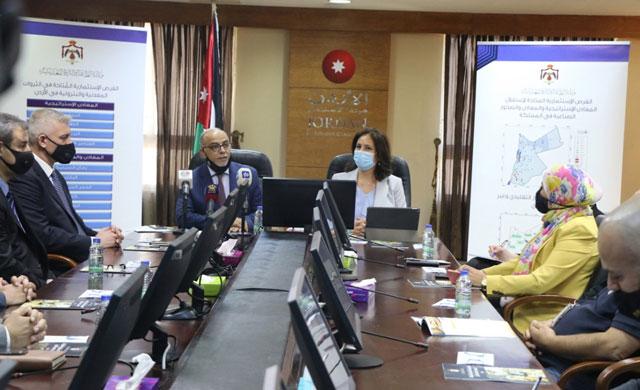- Local News
- Thu-2020-08-27 | 02:24 pm

The ministry has been working on identifying potential investment areas in the petroleum, oil shale and mineral resources, according to Minister of Energy and Mineral Resources Hala Zawati.
The mining sector in its two parts — strategic and industrial minerals — accounted for 7.6 per cent of GDP and 19.7 per cent of the total national exports in 2018, Zawati said during a joint press conference with Chairman of the Jordan Investment Commission Khaled Wazani.
The minister pointed out that the focus is on strategic minerals such as gold, copper, zircon and rare earth elements, as well as industrial minerals and rocks such as silica sands, basalt, chalk, pure limestone, dolomite, kaolin and feldspar.
There are also open investment opportunities for petroleum and oil shale, the minister said.
A report has been prepared based on previous studies to guide investors in their potential investments, providing characteristics of mineral ores in Jordan, namely their nature and the geological features of their locations, the minister said.
Wazani also said that a geological estimation of each ore is also provided to demonstrate their economic potential.
"We are not just offering ideas, we are offering real and profitable investment opportunities,” he noted.
Meanwhile, Zawati said that the ministry has acquired the necessary legislation to facilitate investments, most recently of which was the Cabinet’s approval of projects for petroleum, oil shale, coal and other strategic minerals.
She highlighted the government's "eagerness” to promote investments in these sectors notably their significance for the growth of the national economy and contribution to the gross domestic product as well as their role in creating job opportunities.
The ministry has "made sure that the incentives offered to investors do not obscure fees that must be paid to the government in exchange for the Kingdom’s resources”, Zawati told The Jordan Times.
The ministry has identified seven areas for oil and gas investments.
In the field of natural gas, and after an 11-year hiatus, the National Petroleum Company resumed its work in drilling wells, as the company "successfully drilled wells" at the beginning of 2019, which resulted in an increase in production rates that reached 19 million cubic feet per day.
Drilling of wells continued in 2020 as scheduled in the company's plan for this year despite the coronavirus pandemic, according to a statement made available to The Jordan Times.
"A milestone” crossed by the ministry, was its mandate in 2018 to the government-owned National Petroleum Company to re-explore the Hamzah field, Zawati said.
Hamzah field's production has decreased during the past 30 years from 400 barrels per day in the 1980s to 10 barrels per day now, according to the energy minister.
As for those looking for new opportunities, Wazani stressed that the JIC will work on allocating a special liaison officer, who will be in direct coordination with the Energy Ministry.
The officer will follow up on investment opportunities and potential investors, according to Wazani.
"This makes the investment process very secure and easy as all needed licences and approvals to launch a project can be found in one place,” he added.
Wazani commended the "great efforts that have been made by the Energy Ministry and the JIC in creating opportunities that are vital for the Kingdom’s various regions”.
Creating job opportunities for the local community contributes to the Kingdom’s overall development, "especially as these ores are found in governorates all over the Kingdom”, the JIC chairman added.
The JIC is "trying
to assure investors that there are real, profitable potential
investments available to create opportunities out of the tough times we
are going through”, Wazani told The Jordan Times.









